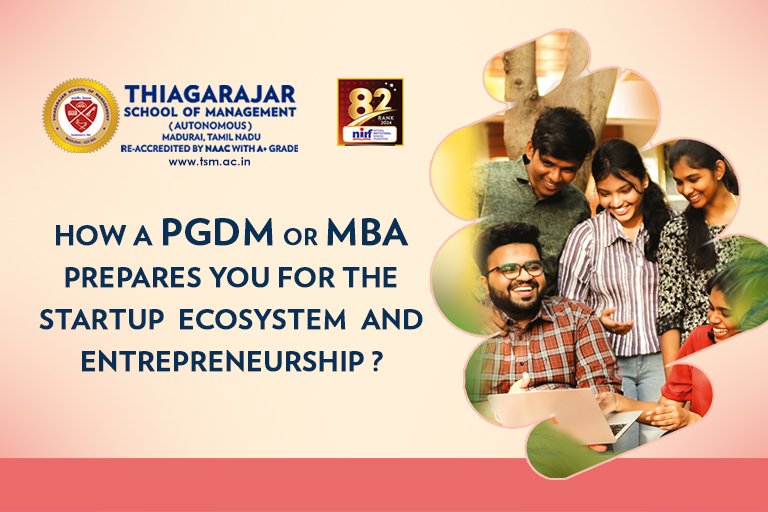
In an age where innovation drives economies and disruption is the norm, the startup ecosystem has become one of the most exciting spaces for aspiring professionals. Whether it’s fintech, edtech, healthcare, or green energy, startups are creating new markets, redefining consumer behavior, and challenging traditional business models. For young individuals with an entrepreneurial spark, the journey often begins with the question: Is an MBA or PGDM the right launchpad for building or joining a startup?
The answer is a resounding yes. A well-designed MBA or PGDM program does much more than teach business theories—it instills an entrepreneurial mindset, provides practical exposure, connects students with investors and incubators, and fosters leadership skills that are essential in the chaotic, high-stakes world of startups.
Startups demand agility, risk-taking, resourcefulness, and strategic thinking. MBA and PGDM programs are structured to train students in exactly these areas. Courses in design thinking, innovation management, business model development, and strategic planning simulate the real-world conditions of building a venture from scratch.
Students are taught to identify market gaps, evaluate customer needs, prototype solutions, and test hypotheses—a cycle that every successful startup founder is familiar with. Moreover, entrepreneurship electives and startup-focused projects allow students to ideate, pitch, and validate their own business plans within the academic environment.
Running a startup doesn’t require mastery in one subject—it requires working knowledge of finance, operations, marketing, analytics, and human resources. MBA and PGDM programs offer this interdisciplinary exposure. Whether it’s preparing a pitch deck for a VC, optimizing a supply chain for
your product, or building a brand presence on digital platforms, students learn the holistic nature of entrepreneurship.
These insights are not just theoretical. Many programs emphasize project-based learning where students consult with early-stage startups, conduct feasibility studies, or develop go-to-market strategies. Such experiences mirror the pressures and rewards of being in a startup environment.
In the startup world, who you know can be just as important as what you know. MBA and PGDM institutes offer access to a diverse peer group, faculty with industry experience, visiting entrepreneurs, and alumni networks. This network can be invaluable when seeking co-founders, hiring your first team, or finding your initial investors.
Events like startup bootcamps, hackathons, business plan competitions, and entrepreneur-in-residence programs open up platforms where students interact with founders, venture capitalists, incubator heads, and startup mentors. These engagements are often the breeding ground for new ventures.
Startups are rollercoasters—one day you close a funding round, the next day you’re dealing with customer churn or regulatory hurdles. What keeps founders going is emotional resilience, adaptability, and leadership.
A PGDM or MBA program fosters these traits through rigorous schedules, group projects, tight deadlines, and continuous feedback. Students learn how to handle failure, how to pivot, and how to motivate teams—all crucial skills in the startup world.
Several top institutions today offer incubation support to student entrepreneurs. Thiagarajar School of Management (TSM), for instance, has launched initiatives to support student startups through mentorship, access to resources, investor connects, and pitch platforms. With Tamil Nadu emerging as a hub for innovation, TSM’s ecosystem enables students to tap into real startup opportunities right from the campus.
TSM also has a dedicated Entrepreneurship Cell (E-Cell), which plays a pivotal role in fostering innovation and guiding students through their startup journeys. The E-Cell actively conducts ideation workshops, startup showcases, mentoring sessions, and collaboration with government and private startup missions.
TSM’s entrepreneurial focus is further reinforced by its industry collaborations, alumni-backed ventures, and startup-themed club activities. Students don’t just learn entrepreneurship—they live it through real-time business planning, mentorship programs, and national-level business plan competitions.
One of the most powerful tools in business education is the case method. Learning through real startup stories—whether it’s about a unicorn’s rise, a founder’s failure, or an innovative pivot—helps students draw practical lessons. At TSM, entrepreneurship case studies are a vital part of classroom discussion, giving students a front-row view into the workings of dynamic, high-growth companies.
Moreover, TSM regularly invites successful founders, angel investors, and venture capitalists for guest lectures, mentoring sessions, and industry panels—ensuring students are constantly connected to the pulse of the ecosystem.
If you’re someone who dreams of launching your own venture or playing a key role in a disruptive startup, TSM offers the ideal environment. With its blend of academic excellence, vibrant club culture, experienced faculty, and strong industry linkages, TSM’s MBA and PGDM programs provide a 360-degree preparation for the entrepreneurial journey.
Admissions for the 2025 batch are now open. Whether you’re looking to ideate, incubate, or accelerate your startup journey, Thiagarajar School of Management, Madurai, gives you the edge to lead with innovation, purpose, and confidence.
Apply now and take the first step toward building something truly impactful.